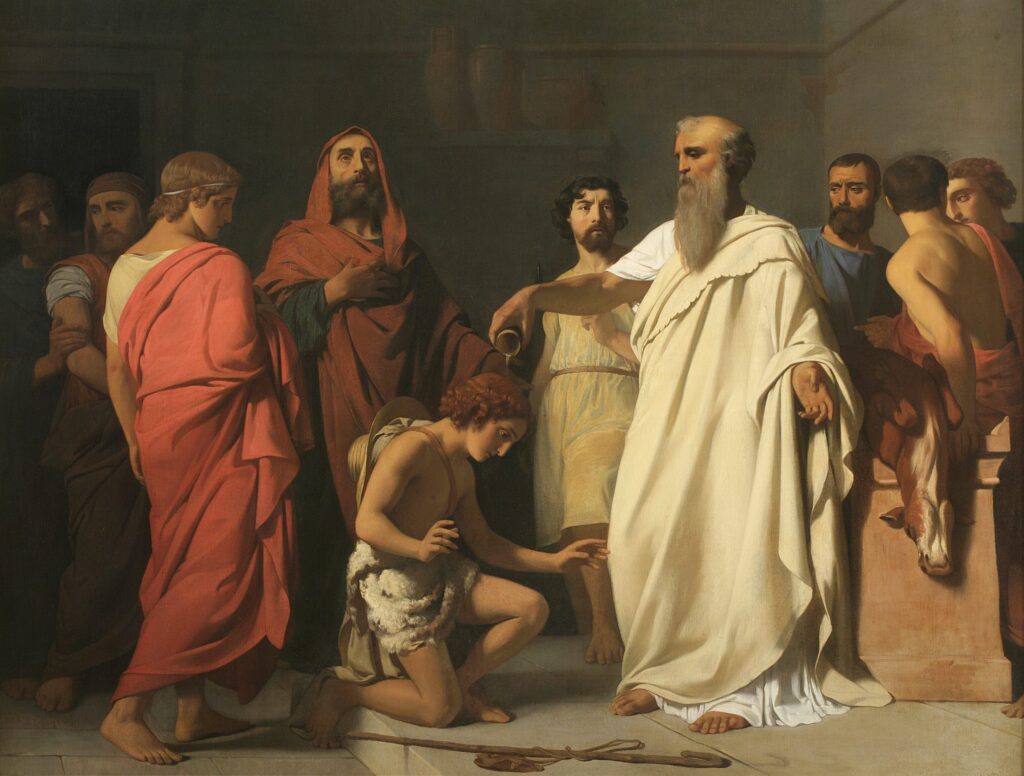
“Now the Lord said to Samuel, ‘You have mourned long enough for Saul. I have rejected him as king of Israel, so fill your flask with olive oil and go to Bethlehem. Find a man named Jesse who lives there, for I have selected one of his sons to be my king.’” – 1 Samuel 16:1 (NLT)
Throughout history, there have been times when God seemingly gives up on a human, multiple humans, or even upon all of humanity. Genesis 6:5, 6 says that “The Lord observed the extent of human wickedness on the earth, and he saw that everything they thought or imagined was consistently and totally evil. So the Lord was sorry he had ever made them and put them on the earth. It broke his heart.” In Genesis 18 and 19 we read of God’s disappointment with the people of Sodom and Gomorrah and the destruction of these two cities.
Of course, in each case, God offers a way of escape, a rescue for those who choose to be rescued. Noah’s family and Lot’s family represent the ultimate faithful remnant and God’s providence and grace toward them.
How do we understand such passages of Scripture for our lives today? What are the lessons embedded in the language of the time?
Let’s look at some incidents recounted in the Bible as a model for our understanding of God’s dealings with his people. In 1 Samuel 10 and 11 we see that the Spirit of God comes powerfully upon the chosen king, Saul. He prophesies and works with great power. But, by the time we get to 1 Samuel 16, we see a different story. Because of Saul’s rebellion against God, the Holy Spirit is taken away from Saul and comes powerfully upon the next anointed one, David (in particular, see 1 Samuel 16:13, 14). In fact, God allows a different spirit (we might call it a spirit of madness) to come upon Saul. The Spirit of God in David can soothe Saul and remove the influence of the tormenting spirit, yet it seems that Saul gives himself over to other influences as he continues to rebel against God.
Throughout this time Saul is still a man and still can choose for himself which influences he will allow, and which influences he will resist. David too has times when he allows God’s Spirit to hold sway and other times when he is driven by his own bad choices and the sins of his soul. God’s love for each leader is constant and either one can return to the power of the Holy Spirit at any time. These incidents occur at a time when God had chosen to interact with humans by bestowing his Spirit upon specific individuals: kings, prophets, and leaders such as Moses, Joshua, and Abraham. But since the day of Pentecost in the first century of the church, God has poured out his Spirit upon all of humanity (see Acts 2:17 and following). This same power that was available to Saul, David, and other leaders of Israel, is now available to average human beings.
So, what can be said regarding the removal of the Holy Spirit from the life of the individual? The Bible speaks clearly to those who have given their lives to following Jesus and tells us that God’s Spirit will never leave his people (Hebrews 13:5; John 14:15-21). The Bible also makes it clear that those who do not follow Jesus cannot receive those benefits (also John 14:15-21). It does not speak directly to those who once followed Jesus and then chose not to follow Jesus, but we can see what happened in Saul’s life when he rebelled against God; and so, we would do well to remain humble and agnostic[1] on what would be the outcome, regarding the Holy Spirit, for those who cease to follow the Lord.
It is important to notice that in all these circumstances it breaks God’s heart to be alienated from individual humans or from humanity (see 1 Samuel 16, Genesis 6, and the whole of Genesis 3). God’s love for humanity always overcomes his disappointment with the behaviour of humans, but we can break his heart by our actions.
What does this mean for us today? Like David at his best, like Saul in his early life of commitment to God, and like humanity at its best, you and I can choose this day whether we will be a person after God’s own heart (1 Samuel 13:14) or if we will exist as people who “cannot receive him, because [we don’t] …recognize him.” (John 14:17). We may not understand whether God could or would remove his Spirit and his power from our lives. We may not understand how God might withhold his power in certain circumstances of our lives or certain configurations of world powers. What we can do is seek to do all that is in our power to follow the one person who followed God completely.
[1] The use of the word “agnostic” in this context indicates undecided, non-committal, or unsure. It is not a reference to a general agnostic philosophy of life.